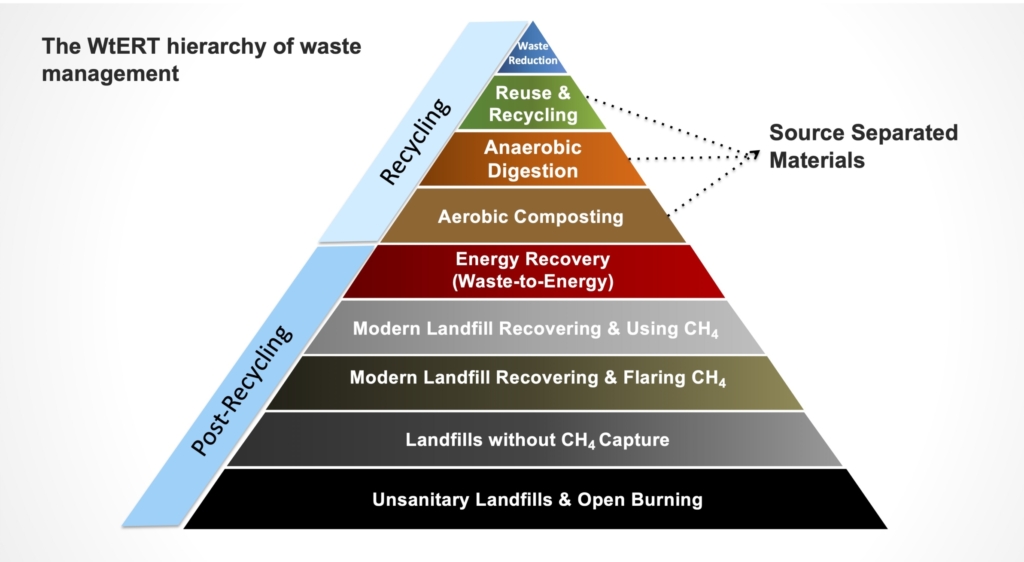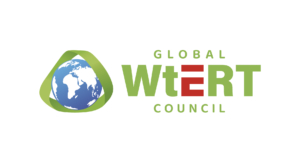Charter of the Global WtERT Council – WtERT®
I. Introduction
Since 1997, the Earth Engineering Center (EEC; earth.engineering.columbia.edu) of Columbia University, has conducted research on the generation and disposition of used materials and products in the U.S. and globally. Economic development has resulted in the annual generation of billions of tons of used materials which represent a considerable resource but, when not managed properly, constitute a major environmental problem both in developed and developing nations. The goal of EEC was to identify and help develop the most suitable means for managing various solid wastes research, and disseminate this information by means of publications, the development of a data and communication infrastructure in the worldwide web, and technical meetings. EEC is also collaborating with BioCycle journal in carrying out a bi-annual survey of generation and disposition of MSW in the U.S. that is now being used by U.S. EPA in computing greenhouse emissions from waste management.
This research has engaged many M.S. and Ph.D. students on all aspects of waste management. Since 2000, EEC has produced nearly fifty theses and published nearly one hundred technical papers. In 2002, EEC co-founded, with the U.S. Energy Recovery Council (ERC; www.wte.org), the Waste-to-Energy Research and Technology Council (WtERT®), which is by now the foremost U.S. research organization on the recovery of materials and energy from solid wastes.
In the course of its studies, EEC established that one billion tons of MSW are landfilled each year, landfilling will continue to be used in the foreseeable future, and nearly 80% of the world’s landfills are not equipped to protect surface and ground waters from contamination. Therefore, in 2008 EEC proposed the expanded Hierarchy of Waste Management that differentiates between traditional and sanitary landfills.
Over the years, sister organizations to the WtERT® in the U.S. have been created in several other nations such as Brazil, China, Germany, Italy, and India. In the interest of the common goal of these organizations, of advancing sustainable waste management, it became necessary, at the end of 2011, to create a U.S. non-profit organization named the Global WtERT Council (WtERT®) and establish a WtERT® “Charter” that was agreed upon by the existing national members at that time. The WtERT® Charter is used to explain the operations of the Council to other regions of the world who may wish to become members; and also, to existing and prospective industrial and government sponsors.
II. WtERT® vision: Science+Collaboration+Education+Impact = Sustainability
The mission of the Global WtERT Council (WtERT®) is to develop and inspire scientific knowledge-based solutions on managing residual non-recyclable wastes for a just and prosperous circular economy society, and to bring that knowledge and technologies to bear on public and private policymaking, as well to educate future leaders.
WtERT® was founded and remains a project of the Earth Engineering Center, Columbia University. It will encompass all sister organization representing universities and research institute, and will rely on Earth Engineering Center’s decades of research, and involve several research centers from across many disciplines and schools at the Columbia Climate School.
III. Name of the WtERT National Organizations
The principal tool for disseminating information by the U.S. and other existing members of WtERT has been the internet. The web addresses used (www.wtert.org, www.wtert.net, www.wtert.gr, www.wtert.ca, epsehost.env.kyoto-u.ac.jp/wtert, etc.) all include the acronym WtERT and this has the advantage that when one types WtERT in Google or other search engine, one links to WTERT organizations in different countries. Thus, WtERT has become a valuable brand name and can be very helpful to people seeking information on waste management in a particular country (e.g. India) by using the acronym WTERT and then the name of the country. It is therefore necessary for member nations to register and use the “wtert” web address (e.g. www.wtert.gr) as well as whatever other name and web address they wish. For example, the sister organization in Japan host WtERT® web at their university webpage epsehost.env.kyoto-u.ac.jp/wtert this allows them to save time and money of managing a dedicated web with hosting and maintenance service.
In summary, new members must use the WtERT® logo follow the Brand Identity Guidelines, in addition to their country name to express the mission of their organization in their national language; (e.g., “WtERT-Brazil”, etc.) to express the fact that they are a member of the Global WTERT Council).
IV. WtERT® objectives
WtERT® and its members identify the best available technologies for the treatment of various waste materials, conduct additional academic research as required, and disseminate this information by means of publications, in their respective websites as well the WtERT Decision Support System (WtERT-DSS) (www.wtert.net), and periodic meetings. In particular, WtERT members strive to increase the global recovery of energy AND materials from residual non-recyclable waste.
There are a broad variety of technologies for sustainable waste management worldwide.
The guiding principle is that responsible management of wastes must be based on science and best available technology at a particular location and not what seems to be inexpensive now but can be very costly in the future.
The essence of sustainable waste management is the recovery of material AND energy resources from the residues of human activities. Used objects and materials that can be re-used, recycled or composted economically and at a reduced GHG burden. E.g. automobiles, appliances, electronic equipment, bulk paper, some types of plastics and organic wastes, should be separated at the source and recycled as materials or soil conditioner. The remaining post-recycling residues of human activity must be directed to waste-to-energy (WTE) power plants that are able to recover energy, metals, and inorganic materials. Until there is sufficient WTE capacity for a municipality, post-recycling wastes may be disposed in sanitary landfills. However, sanitary landfilling entails the use of land and GHG generation, so it is not sustainable in the long run.
 Figure 1: The WtERT hierarchy of waste management
Figure 1: The WtERT hierarchy of waste management
V. Scope of Operations of National/Regional WTERT Members
The objectives of each WtERT® national/regional member are:
- To develop and maintain a WtERT® web page that describes the mission and scope of the organization and links as many as possible academic and industrial research groups working on various aspects of waste management, within the nation. Preferably, this web page will be hosted at a major university that is conducting research on resource recovery from wastes. Most of the material in this web page will be in the national language so as to inform the general public and policymakers as well as academia and industry. However, the front web page should also provide for English language translation of part of the content, as discussed in (2) below.
- To identify the most suitable technologies for the treatment of various waste materials in the nation, encourage additional academic research as required, disseminate this information within the nation, and provide an English language window for the outside world to learn about problems and opportunities for advancing waste management in their respective nation.
- Once the organization platform described in (a) and (b) has been created, the national or regional WTERT member can seek sponsorship and funding by industry and government organizations concerned with advancing waste management in the nation. This model of operation has been successful with some of the existing WTERT national members who are willing to advise and assist new members.
VI. Organizational structure
- The founding Chair of WtERT® and the Global WtERT Council is Prof. Nickolas Themelis. The first elected Chair of the Global WtERT Council will be elected for a ten-year term by majority vote of the Chairs of the WTERT national organizations and the four senior officers of Global WtERT Council, Inc. The first such election will take place before the end of 2021 among candidates proposed by the voting members who may include the voting members.
- The founding Chair of each national organization is appointed by WTERT for a period of five years. During the 5th year of tenure, the members of the national organization must elect by majority vote a new Chair or re-elect the existing Chair for a successive five-year term.
- WTERT national organizations who do not maintain their WtERT® web page and pursue actively the above WTERT objectives will be removed from the roster of WTERT sister organizations.
VII. Global WtERT Council, Inc.
For financial and tax reasons, in December 2011, WtERT was registered as a non-profit corporation in the State of New York and the U.S. At this time, the board members of Global WtERT Council, Inc. are Prof. Huang Qunxing (President of the Board), Prof. Nickolas J. Themelis (Founder), Prof. Marco J. Castaldi, Mr. Werner Bauer, Mr. Reda Kabbaj and Mr. Yuri Schmitke A. B. Tisi.
